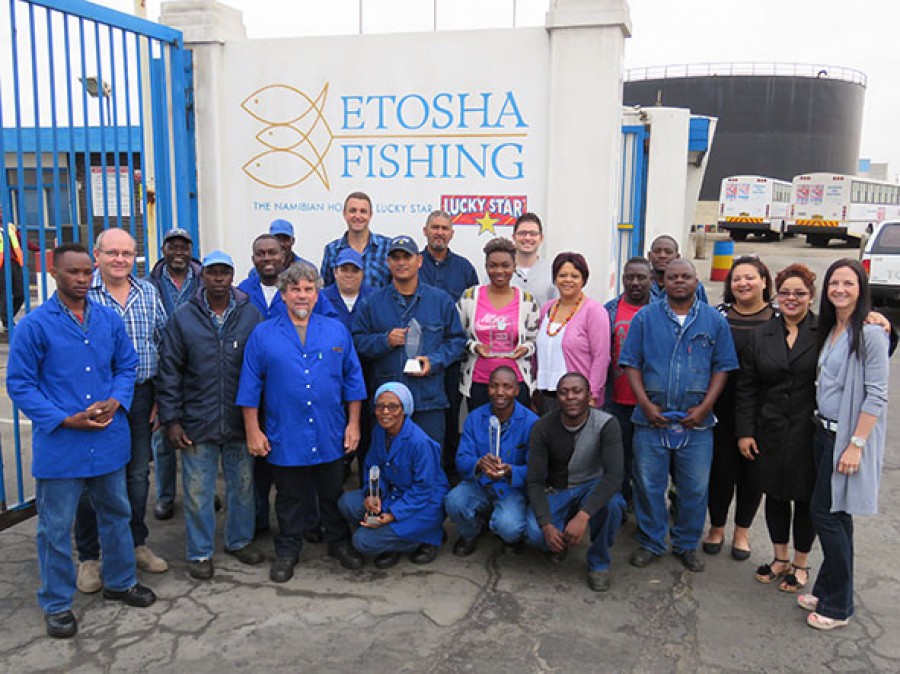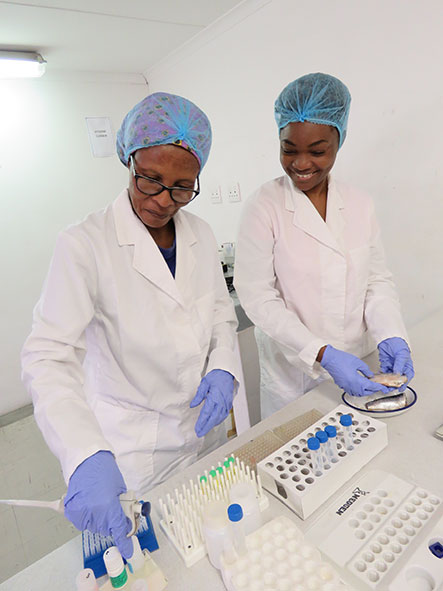
Etosha Fishing Corporation won four of the five large
enterprise categories at the 5
th Annual National Quality Awards
hosted by the Namibian Standards Institution (NSI) in November, scooping up
Company
of the Year,
Exporter of the Year and
Product of the Year. Etosha Fishing
Quality Manager Linekela Kapundja also received the I
ndividual Award for
Quality.
In 2015 Etosha Fishing managed the same feat by winning all four
categories, going on to win Company of the Year and Exporter of the Year at the
2014/15 SADC Quality Awards. With this achievement the company will once again
pit itself against other winners from the SADC Region at the next annual SADC
Quality Awards.
“We are absolutely delighted to once again receive recognition
for our efforts to ensure quality in all we do,” says Etosha Fishing MD Pieter
Greeff. The company has shown consistent results in the Quality Awards since
2013 when it came second in the Large Enterprise Quality Award category, going
on to win the large enterprise Quality Award, Exporter of the Year and
individual Quality Award in 2014.
The NSI Quality Awards programme was introduced in 2012 with
the aim of honouring companies who contribute to quality advancement in all sectors
of the Namibian economy by having measurements and quality systems, procedures
and processes in place that are in line with local, regional and international
practices. The programme also recognizes companies who use quality advancement
to support national economic development and growth.
Etosha Fishing is a leading player in the Namibian fishing
industry and operates in a business environment where its customers are the
market leaders in the canned pilchard industry on the sub-continent, including
the revered Lucky Star and Glenryck brands. Its cannery is a world leader in
fish processing with advanced automated equipment unrivalled in Southern Africa.
The company broke ground in 2013 with the introduction of
its own EFUTA Maasbanker brand, leading the way with value addition by canning
locally caught horse mackerel. This has satisfied an emerging need in the
market for a good quality product alternative at a time when economic hardship
has caused many consumers to move away from higher end products. The venture also allowed
for a more sustainable business operation with longer term employment for more
Namibians. Since the introduction of EFUTA Maasbanker to the local
retail market at the start of 2014, sales volumes have increased five-fold.
EFUTA Maasbanker was the first Namibian canned product to
receive the NSI Standard Mark of Conformity product endorsement and proudly carries
the Team Namibia logo. Along with all other canned products, EFUTA Maasbanker
is Halaal certified. Etosha Fishing’s
factory also carries Kosher certification by the Union of Orthodox Synagogues
of South Africa.
“This means
that our products can be consumed by people of any culture or religion. Through
these certifications our products act as ambassadors to the Namibian
Manufacturing and Food Industry outside of Namibia,” says Greeff.
Quality Management
Etosha Fishing knows that it is not a static business in a
static environment. In order for the organisation to achieve sustained success,
it applies a quality management approach. Critical quality aspects of the
manufacturing process are managed throughout the system, from the sea to the
final point of dispatch to the customer, providing the assurance that the
customer can consistently expect a product of excellent quality, according to
Etosha Fishing Quality Manager Linekale Kapundja.
 Quality Assurance Manager Linekela Kapundja (pictured
right) is in charge of maintaining and improving quality management at Etosha
Fishing. She scooped up the Individual Award for Quality at the NSI Quality
Awards, given to an individual who has made significant input into Namibian
Standards, Quality Assurance, Accreditation and Metrology efforts. Quality
Supervisor Zola Udigeng (left) is lending a hand during laboratory testing.
Quality Assurance Manager Linekela Kapundja (pictured
right) is in charge of maintaining and improving quality management at Etosha
Fishing. She scooped up the Individual Award for Quality at the NSI Quality
Awards, given to an individual who has made significant input into Namibian
Standards, Quality Assurance, Accreditation and Metrology efforts. Quality
Supervisor Zola Udigeng (left) is lending a hand during laboratory testing.
“Our quality management system is based on the principle of
ISO9001 and we use HACCP as a measure to control food safety risks. Etosha
Fishing is certified to HACCP by the NSI through an inspection and audit
program. All our products are also inspected by the NSI for compliance with
canned food manufacturing regulations and also by the South African National
Regulator for Compulsory Specifications (NRCS). We have an extensive risk
management programme in place that is based on the principles of OSHAS 18001 and
ISO 14000,” Kapundja elaborates.
Etosha also
maintains a continuous improvement program, applying priorities that are based
on market trends and research data, inputs received from customer satisfaction
data as well as suppliers and other interested parties. Social, environmental
and economic changes are analysed to broaden the product range, achieve growth
and ensure operational efficiency and sustainability. To this effect trials are
currently underway to test new flavours in the EFUTA Maasbanker range,
including a curry sauce and minced horse mackerel in tomato sauce, which will
be available in the market as soon as the shelf life tests are completed.
Employee engagement
An integral part of Etosha Fishing’s quality management
focus is successful employee engagement.
“We engage our employees through training so that they
understand the importance of producing quality products in a safe work
environment,” says Greeff. He notes that
employees go through quality induction training and refresher training
through-out the year which involves and array of topics, including good
manufacturing practices, HACCP principles, personal hygiene and basic hygiene
for food handlers, quality controllers training and good laboratory practices.
“On the production floor, team work is necessary to ensure
product quality. Quality incidents are recorded and immediate corrective
actions can be taken at shift team leader and quality supervisor level,” says
Quality Manager Kapundja.
All these
efforts have placed Etosha Fishing products among one of the best quality
canned products, not just in Namibia, but in Africa and worldwide.
Investments
Significant investments have been made over the past five
years to ensure improved quality and operational efficiency of the company. Highlighting
just a few of the improvements, Greeff explains that the company most recently
invested N$5.5 million to upgrade its thawing system in the cannery, which increased
its capacity to thaw fish from 120MT per 24 hour shift to around 180MT per 24
hour shift. With Namibia’s pilchard resource under pressure for some years now,
Etosha Fishing has been importing frozen pilchards for processing on local soil
since 2010, which has contributed significantly to the creation and sustaining of
additional local jobs despite poor pilchard catches.
In addition, one of its trawler vessels, Iona, was upgraded
and overhauled at a cost of N$17 million to enable Etosha Fishing to catch
horse mackerel in Namibian waters.
A reverse osmosis plant and can drying system was installed in
its processing plant to reduce product rust due to the unsuitability of the
Walvis Bay water for can cooling. This has reduced product loss due to rust by
98%. In addition the brine effluent of the reverse osmosis plant is added to
the seawater treatment plant to augment supply of seawater to the cannery.
As an environmentally conscious corporate citizen, the
company implemented an energy management plan to reduce electricity usage. Another
energy saving measure includes the installation of a new pre-heating system for
boiler water based on the use of waste fish cartons as fuel, thereby reducing
the fuel required for its boiler water heating.
 Etosha Fishing Corporation won four of the five large
enterprise categories at the 5th Annual National Quality Awards
hosted by the Namibian Standards Institution (NSI) in November, scooping up Company
of the Year, Exporter of the Year and Product of the Year. Etosha Fishing
Quality Manager Linekela Kapundja also received the Individual Award for
Quality.
Etosha Fishing Corporation won four of the five large
enterprise categories at the 5th Annual National Quality Awards
hosted by the Namibian Standards Institution (NSI) in November, scooping up Company
of the Year, Exporter of the Year and Product of the Year. Etosha Fishing
Quality Manager Linekela Kapundja also received the Individual Award for
Quality.